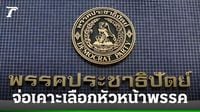The political atmosphere in Thailand is abuzz with anticipation as the Democrat Party prepares for a pivotal leadership transition. According to reports from multiple Thai news outlets, the party’s acting executive committee will convene on September 18, 2025, at 10:00 AM inside the Parliament building—a meeting that could set the stage for a dramatic reshaping of the country’s oldest political party.
The Democrat Party, which has faced turbulent times and waning influence in recent years, finds itself at a crossroads. The September 18 meeting, as confirmed by the Secretary-General of the National Assembly and widely reported on September 15, will focus on determining the date, time, and venue for a special general assembly. The purpose? To elect a new executive committee and, most crucially, to select a new party leader. The sense of urgency is palpable, with party officials stressing that swift decisions are needed to ensure the party’s readiness for upcoming national and Bangkok gubernatorial elections.
Tanitpol Chainan, the party’s director, explained the stakes to the press: “The meeting of the acting executive committee is to consider the date, time, and place for the special general assembly to elect a new executive committee. The party’s regulations are open, allowing a broader range of candidates to participate. This is a chance for the party to renew itself and widen its appeal.”
This openness is more than a bureaucratic technicality. It signals a moment of introspection and reform for the Democrats, who have struggled to regain their footing after electoral setbacks. According to Tanitpol, both national committee members and local branch representatives are showing “enthusiasm for the prospect of new leadership,” viewing the process as a beacon of hope for a party eager to reclaim its relevance and vigor.
With elections looming on the horizon, the pressure is on. “Everything must be decided quickly,” Tanitpol emphasized, “otherwise, we might not be ready in time for the elections that could be called at any moment.” The timeline is tight: party insiders expect the new leader to be chosen by the end of October, giving the Democrats just enough time to rally behind a new figurehead before entering the electoral fray.
But who will that new leader be? The speculation is intense, and the stakes could hardly be higher. Former MP Sathit Wongnongtoey, a prominent voice within the party, didn’t mince words about what’s at stake: “We’ve reached the point where the Democrat Party must be revitalized. The process should be open to those who have earned trust and have previously served the party well. They should be welcomed back into significant roles.”
Sathit’s remarks have fueled rumors of a possible return for some of the party’s most recognizable faces. “If the Democrats have learned from past lessons and are ready to open up, there are many who should be invited or given a pathway back into the party’s leadership,” he said. Among the names being floated are Abhisit Vejjajiva, the respected former prime minister, and Korn Chatikavanij, another veteran Democrat with a strong reformist reputation. “From what I’ve seen in the news and from interviews, it appears that Chuan Leekpai, a former party leader and current list MP, supports Abhisit’s comeback,” Sathit noted, adding a dose of political intrigue to the proceedings. “But ultimately, it’s up to the current party members to decide.”
This moment of potential renewal comes as the Democrat Party faces significant competition from rivals like the Pheu Thai and Move Forward parties. The same National Assembly session on September 18 will also address activities involving these parties, reflecting a broader period of flux and realignment in Thai politics. As reported by the Secretary-General of the National Assembly, the assembly’s agenda underscores the shifting landscape in which all major parties are jockeying for position ahead of possible snap elections.
The Democrats’ willingness to consider returning veterans is seen by many as a pragmatic move. In Thai politics, where party loyalty and public trust can be fragile, bringing back experienced leaders could help restore confidence among rank-and-file members and the wider electorate. “It’s about learning from the past and making space for those who have proven themselves,” Sathit said. His comments echo a broader sentiment within the party that a blend of experience and openness to new ideas may be the recipe for survival—and perhaps even resurgence.
Yet the process is not without its critics. Some observers worry that simply recycling old leaders may not be enough to address the deeper issues facing the party. The Democrats have long prided themselves on their institutional stability and commitment to democratic norms, but recent years have seen them lose ground to more populist and reformist movements. The challenge now is to balance tradition with innovation, and to convince voters that the party can offer something fresh while remaining true to its core values.
For now, all eyes are on the September 18 meeting. The Parliament building will be the stage for what could be a defining moment in the Democrat Party’s long history. The urgency is unmistakable; as Tanitpol put it, “We must act quickly, or we risk missing the opportunity to prepare for the next elections.”
The coming weeks will be critical. If the Democrats can navigate this transition smoothly, embrace a spirit of renewal, and perhaps even welcome back some of their most seasoned leaders, they may yet find a way to reassert their relevance in Thai politics. But if internal divisions persist or the leadership contest becomes mired in factionalism, the party risks falling further behind its rivals.
As the date approaches, party members, political observers, and the public alike will be watching closely. For the Democrat Party, the stakes could hardly be higher: the decisions made in the coming days and weeks will shape not only the party’s future, but perhaps the course of Thailand’s political landscape as well.
The Democrat Party stands at a turning point, with its next moves set to determine its role in an increasingly competitive and dynamic political environment.

